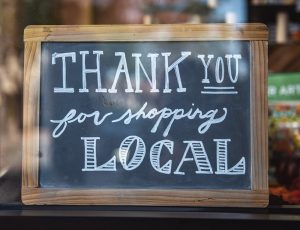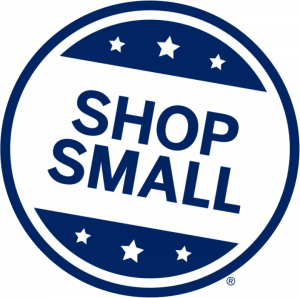The 8 Days of Thanksgiving
So many ways to celebrate the start of the holiday season!
We all know the 12 Days of Christmas, but what about the 8 Days of Thanksgiving? The week of Thanksgiving is stuffed with turkeys, holiday traditions and a cornucopia of shopping events.
Are you prepared for the special demands of the launch of the holiday season? Begin with the warm glow of Friendsgiving, work your way through supporting local on Small Business Saturday, plus online sales of Cyber Monday. And finish by giving back on Giving Tuesday. There are even more days to celebrate—Drinksgiving and Sofa Sunday anyone?
Here’s our guide to an extra long week of seasonal fun and giving.
Friendsgiving
 Start off the week with a Friendsgiving … or two! Carve out time for friends the weekend before Thanksgiving, or pick a day your group prefers to sit down for a shared meal. This holiday is flexible (unlike the fourth Thursday event), with the celebration revolving around your schedule (how convenient!). Typically taking place within a week before Thanksgiving Day, Friendsgiving is the perfect way to preheat your holiday season.
Start off the week with a Friendsgiving … or two! Carve out time for friends the weekend before Thanksgiving, or pick a day your group prefers to sit down for a shared meal. This holiday is flexible (unlike the fourth Thursday event), with the celebration revolving around your schedule (how convenient!). Typically taking place within a week before Thanksgiving Day, Friendsgiving is the perfect way to preheat your holiday season.
The term Friendsgiving first appeared around 2007, but it really started to catch on in 2011, possibly from the influence of TV shows, like Friends and its popular Thanksgiving episodes featuring the cast celebrating the holiday together.
As the name implies, it’s a traditional turkey day dinner with, well, friends. At first popular with college students and young adults, it’s spread to all age groups. It’s both a great alternative when you can’t get together with your family for a traditional Thanksgiving meal and an extra meal to share on another day with your chosen family.
Whether it’s potluck or a full-on Thanksgiving feast, the formality and date are up to you! Just remember to save room for seconds.
Drinksgiving
 Traveling can be a headache, but traveling during the holidays can be a migraine—but so worth it. Many returning home in time for a full-on extended-family turkey dinner will be traveling extra early to make sure to arrive before the carving of the bird.
Traveling can be a headache, but traveling during the holidays can be a migraine—but so worth it. Many returning home in time for a full-on extended-family turkey dinner will be traveling extra early to make sure to arrive before the carving of the bird.
So, if you’re finding yourself with an extra day hanging out in your childhood bedroom, get out and meet up with friends for drinks the night before. The Wednesday before Thanksgiving is known as Drinksgiving, a popular night out at local bars (in some places outpacing New Year’s Eve).
With many folks returning home for the holiday, it’s the perfect time to catch up with those you won’t see on Thanksgiving Day. Drinksgiving is easier than Friendsgiving—no cooking required. Just remember to drink local and take an Uber home.
Thanksgiving
Not much needs to be said about the main event. So, here are some facts to share over pie.
The official Thursday for Thanksgiving has bounced around the calendar since its start in 1789. In 1939 President Roosevelt moved Thanksgiving to the second to last Thursday of November to help extend the shopping season before Christmas, yet some states ignored the change. In 1941 Congress decided to make the official holiday the fourth Thursday of November.
Thanksgiving is primarily an American holiday, although Canada celebrates it the second Monday in October, due to the earlier harvest there. And giving thanks is celebrated in cultures around the world. Liberia and the Netherlands town of Leiden are among those that celebrate an American-style Thanksgiving. Worldwide, other nations celebrate their own version throughout the year to give thanks for country-specific reasons, including Australia, Japan, Germany and India.
Black Friday
 Oh boy! Black Friday—we all know what that means. Shoppers are hyped up, pre-dawn lines form at store entrances and retailers dream of big crowds.
Oh boy! Black Friday—we all know what that means. Shoppers are hyped up, pre-dawn lines form at store entrances and retailers dream of big crowds.
Where did it all start? The term “Black Friday” has a few origin stories. The most popular comes from the 1980s when, after the boom in early holiday shopping, businesses celebrated their balance sheets turning from red to black. The holiday has spread across the world, making Black Friday a major day of shopping for gifts.
This year, take a break from the chaos and mall madness of Black Friday and instead relax in the comfort of your own home for “Small Business Eve,” as we like to call it. Plan which small businesses to visit the next day and create the perfect route to hit all your favorite locally owned shops.
Small Business Saturday
 It’s no secret that Black Friday and Cyber Monday get the most hype, but Small Business Saturday is our favorite (sorry Thanksgiving!). Rather than fighting the lines and parking lot mess at the malls and big box stores, we suggest you support the locally owned stores that make our communities special. Why buy mass-produced when you can buy unique gifts from the Brandywine Valley? Support the specialty shops in our own backyard and spend the holidays shopping local.
It’s no secret that Black Friday and Cyber Monday get the most hype, but Small Business Saturday is our favorite (sorry Thanksgiving!). Rather than fighting the lines and parking lot mess at the malls and big box stores, we suggest you support the locally owned stores that make our communities special. Why buy mass-produced when you can buy unique gifts from the Brandywine Valley? Support the specialty shops in our own backyard and spend the holidays shopping local.
After all, it’s “Buy Local or Bye-Bye Local!” (See the sidebar for ways Small Businesses help our communities.)
Sofa Sunday
Don’t let the name fool you. Sofa Sunday isn’t trying to get you to buy a new couch every year. It’s the day designated for getting cozy in your best impractical loungewear, surfing the Internet for the best Cyber Monday deals and prepping your cart for when the clock strikes midnight. All from the comfort of your sofa.
With more than two-thirds of Cyber Monday shoppers spending as much, if not more, time searching for deals on Sofa Sunday than shopping Cyber Monday, you need to be prepared. So heat up some Thanksgiving leftovers, set yourself up on your sofa, and start searching for the best sales online.
And look beyond Amazon, Target and Best Buy. After all, our local shops have on-line specials to check out.
Cyber Monday
Cyber Monday was coined in 2005 after the National Retail Federation noticed a spike in on-line sales the Monday following Thanksgiving. A coincidence? Absolutely not! People were using their speedier Internet connections at their offices on Monday to get a jump on the best deals and avoid the kiddos seeing their holiday gifts too early.
Now Cyber Monday reports record-breaking sales, hitting over $10.8 billion even in 2020! Just imagine how much money we’d be spending without the sales!
Giving Tuesday
 Last, but perhaps best, is Giving Tuesday. The term was first used by New York’s 92nd Street Y to encourage others to do good and keep the giving spirit alive during the holidays. Since Giving Tuesday falls late in the tax year, many nonprofit groups use it to launch end-of-year giving campaigns.
Last, but perhaps best, is Giving Tuesday. The term was first used by New York’s 92nd Street Y to encourage others to do good and keep the giving spirit alive during the holidays. Since Giving Tuesday falls late in the tax year, many nonprofit groups use it to launch end-of-year giving campaigns.
Even though Giving Tuesday is linked to the U.S. Thanksgiving holiday, it’s blossomed into an international movement. This growth is largely thanks to social media and the push for everyone to give, collaborate and celebrate generosity, especially during the holidays.
Look out for the #GivingTuesday on social media and do your part.
Why not challenge yourself by keeping a log of all your savings from the Black Friday/Cyber Monday deals, then donate what you saved on Giving Tuesday? That’s some good karma.
The 8 Days of Thanksgiving is a marathon event. Luckily, you have time to plan your menus and research your shopping. Please remember to buy local and keep the giving spirit alive through Christmas … and beyond.
Small Businesses are a Big Deal
 Did you know about 28 million small businesses operate in the U.S. alone, according to the Small Business Administration (SBA), generating 66% of all new jobs since 1995. And their special day, Small Business Saturday, promoted by American Express starting in 2010, encouraged more than 108 million people to “shop small.”
Did you know about 28 million small businesses operate in the U.S. alone, according to the Small Business Administration (SBA), generating 66% of all new jobs since 1995. And their special day, Small Business Saturday, promoted by American Express starting in 2010, encouraged more than 108 million people to “shop small.”
Why should you shop small on Small Business Saturday … and every day, in our opinion? Here are some huge reasons. Need more? Read the Forbes article “43 Reasons You Should Support Small and Independent Businesses.”
When you buy from a small business, you’re supporting a real person. There’s a real person behind every small business—someone who took the risk and built the business. The owner, who may be a friend, neighbor or familiar face in your community, would probably high five you for shopping there, except for, well, Covid.
Your purchases stimulate the local economy. Small businesses generate $68 of local economic return for every $100 spent with them. The sales taxes they pay stay in the local economy to fund public schools, libraries, parks, firefighters and other public services. Over $9.3 billion would be returned to our economy if every family spent just $10 a month at local businesses!
Local businesses hire local people. The SBA reports that local businesses added 8 million jobs to the American economy since 1990, while large chains eliminated 4 million jobs.
Successful small businesses attract more businesses (and more jobs) to the community. Many small business owners also give back by encouraging and mentoring other entrepreneurs, and purchasing products or services from other local small businesses. It’s a win-win.
Small businesses give back (more) to the community. They donate profits, services and goods to local (rather than national) nonprofits and charities. Small businesses donate 250% more than large businesses to community causes. Plus small businesses and boutique shops add unique character to your town.
Small businesses get to know their customers. You’re not just an account number to a small business. The owner may even know your name. They strive to provide more personable, hands-on and better customer service with personalized advice and even demos!
Small businesses provide greater access to diverse products. Local businesses respond to local demands and tastes, and small businesses have just as much access to vendors (who also determine pricing, not stores) than big box businesses do. If a small business doesn’t have the products you want, ask them—they’re usually more willing to order them for you.
Small businesses create a sense of community. You’re much more likely to get to know a small business owner in your neighborhood. According to a study reported in Forbes, the second most desirable community feature in a town is a stronger sense of community. Number 1 is more local restaurants, many of which are also small businesses.
Shopping local is green. Shipping produces 1 billion metric tons of C02 a year. And think about all those cardboard boxes and plastic packing material.
You’ll feel good. Would you rather feel the pang of guilt buying so-so coffee from a chain or a lifeless burger at a drive-through, or be entirely satisfied with your latte made locally with love and a great burger from a small business owner who serves you herself?
